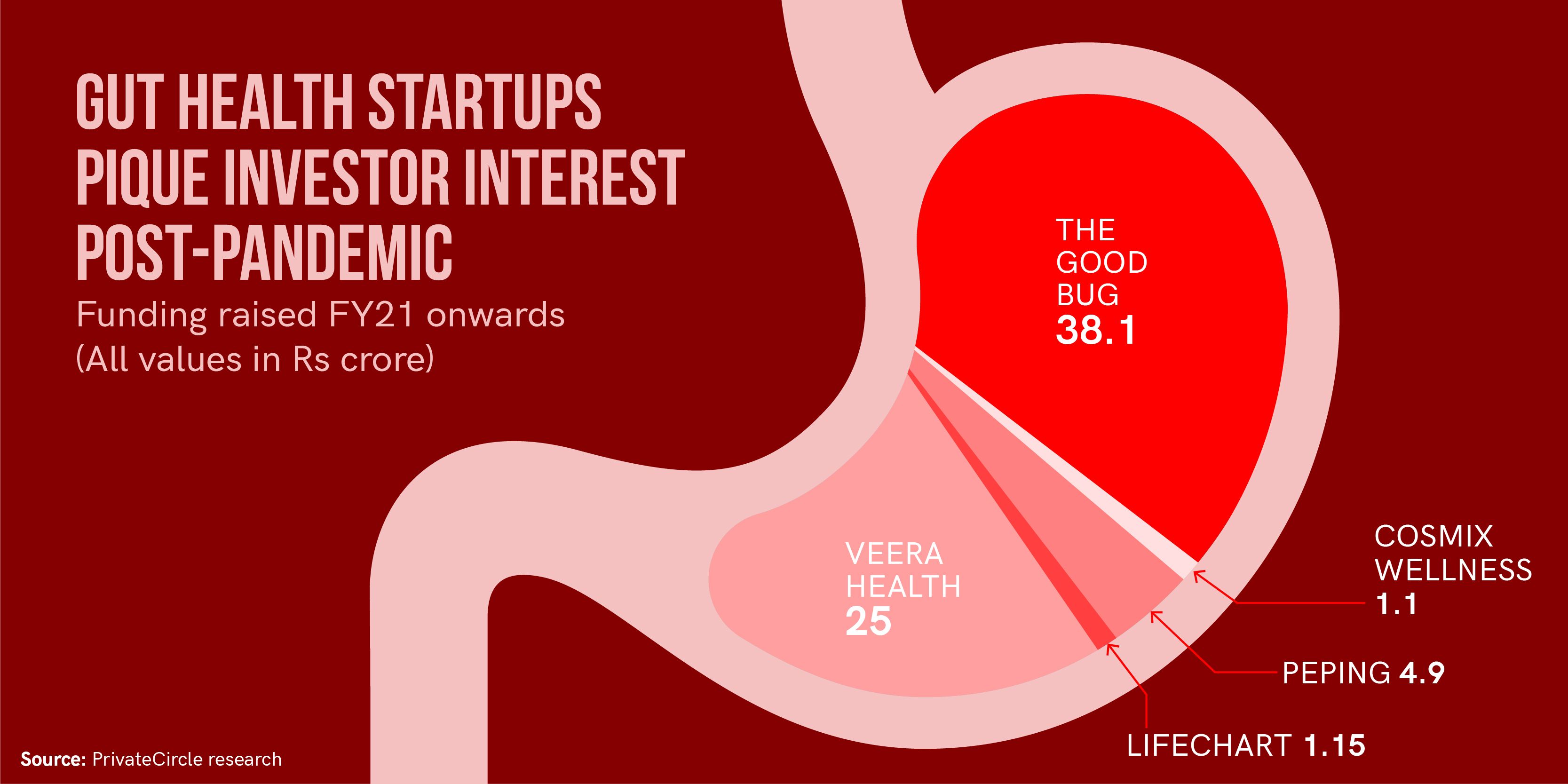
If you’re craving ice cream, or perhaps something salty like wafer chips, or maybe imli toffees for a tangy kick, is it really you desiring these foods or your gut telling you what to eat? This postulation has plagued both biologists and philosophers alike.
In essence, the gut is a being of its own. It is home to more bacteria than there are cells in the human body, and other than commanding metabolic functions, it also influences brain chemistry.
Over the last two years, a host of gut health-focused startups have emerged in India, propelled by active discussions on social media and a rising interest in the microbiome—a community of microorganisms in the gut that play a crucial role in promoting digestion, boosting immunity, and improving metabolism.
Platforms such as The Good Bug, Cosmix Wellness, and Veera Health offer products that balance the microbiome to target concerns like weight management, bloating and gas, diabetes management, and Polycystic Ovarian Syndrome (PCOS).
Investors, too, are looking at the space closely. According to data sourced by PrivateCircle, a private market intelligence platform, the top ten firms in the space—including The Good Bug, Lifechart, Leucine Rich Bio, and Peping, among others—raised upwards of Rs 43 crore in FY24 alone.
A venture capital investor, who did not want to be named, touted gut health startups as the “next big bet” for healthcare investments. “So many of them (startups) have come up in the last few years. With India’s healthtech scene presenting no significant opportunity lately, microbiome startups offer a refreshing take in a field dominated by large pharma and FMCG (fast-moving consumer goods) players,” this person said.
The boom
Pharmaceutical companies like Sanofi, Dr Reddy’s, and NexGen have been selling prebiotic and probiotic pills and powders for more than three decades. FMCG brands such as Hindustan Unilever Limited also moved quickly to make their mark in the emerging industry by investing in Wellbeing Nutrition and Oziva last year.
“The category used to be largely prescription-driven. On the consumer front, Yakult made waves but was focused on overall well-being and contains a lot of sugar,” says Keshav Biyani, Co-founder of The Good Bug.
The pandemic played a massive role in drawing attention to preventive healthcare, with consumers eager to try options that are easily available, affordable, and showed some signs of efficacy. Several startups sprung up in its aftermath, including The Good Bug, Cosmix Wellness, Peping, and Veera Health, among others, to capitalise on the opportunity.
It also marked a pivotal shift in the sales of nutraceuticals—from being prescription-led to selling over-the-counter. Now, many startups have turned to the direct-to-consumer (D2C) route through websites and marketplaces like Amazon and Flipkart as an easier way to tap into the market.
Instead of attempting to solve blanket issues, these startups address specific problem areas. For instance, The Good Bug’s sleep support supplement contains the Lactobacillus reuteri probiotic which assists in alleviating stress and promoting sound sleep. Meanwhile, Veera Health’s gut refresh pill contains a mix of probiotics like bifidobacterium and prebiotics like fructose-oligosaccharides aimed at replenishing good gut bacteria.
“Every body function is interdependent. We grow up treating our body as isolated parts without realising that the gut is a dealbreaker,” Vibha Harish, Founder of Bengaluru-based Cosmix Wellness, tells YourStory.
An engineer by qualification, Harish completed multiple certifications as a herbalist before building Cosmix Wellness. The startup was featured on Shark Tank India in February and bagged a Rs 1 crore investment from Namita Thapar, CEO of multinational pharmaceutical company Emcure.
According to a survey by German plant-based functional ingredients maker Beneo in 2020, the Indian market provides a lucrative opportunity with 53% of respondents stating they faced digestive problems. India’s nutraceuticals market is expected to grow to approximately $18 billion by 2025, as per data shared by the Ministry of Food Processing Industries.
<figure class="image embed" contenteditable="false" data-id="541685" data-url="https://images.yourstory.com/cs/2/f3638ff0dcc111ec93bca187955479ef/GutHealthStartupsV2Infographic-1712044490432.jpg" data-alt="gut health" data-caption="
Infographic by Nihar Apte
” align=”center”> Infographic by Nihar Apte
.thumbnailWrapper{
width:6.62rem !important;
}
.alsoReadTitleImage{
min-width: 81px !important;
min-height: 81px !important;
}
.alsoReadMainTitleText{
font-size: 14px !important;
line-height: 20px !important;
}
.alsoReadHeadText{
font-size: 24px !important;
line-height: 20px !important;
}
}

Spreading the word
New-age brands are spreading the word through social media influencers, some of whom are doctors. For instance, doctor-influencer Dr Pal Manickam has endorsed The Good Bug’s product targeted at burning fat and easing weight management.
Manju, a 28-year-old techie based in Bengaluru, came across Instagram advertisements of supplements by The Good Bug and Healthkart when she was experiencing indigestion and bloating. Going nowhere with homegrown remedies, she tried out nutraceutical supplements and observed notable improvements in her health.
“Bloating started to fade gradually and I was able to eat with minimal acid reflux. It’s nice to have a normally functioning stomach,” she quips.
“Influencers are the ones who can educate and build awareness among consumers. Bringing on board doctors and fitness experts will add credibility when they speak from a scientific perspective to share accurate information,” The Good Bug’s Biyani says.
On the other hand, Cosmix Wellness—which houses about 15 products including plant protein powder and hormonal acne remedies—is tapping into content-to-commerce play. Through YouTube videos and Instagram posts, it’s pushing educational content topics including dealing with cramps, recipe options for protein-rich meals, and acne management.
“We want to create an education-first brand. Unbiased information is essential to help users understand why they would require a supplement in the first place,” Harish adds.
Understanding the science
Like any healthcare product, gut-focused supplements require extensive research backing.
In 2009, the National Institute of Sciences at Alabama State University conducted a $150 million project that managed to link genetic sequences of the microbes living in the body to the effect it has on different body systems. Institutions around the world jumped to further explore this connection.
In 2023, Washington University School of Medicine in St Louis conducted a study which found that the gut microbiome also plays a key role in the health of our brains.
“There is sufficient scientific backing that there is a correlation between the gut and overall health. But it is important for consumers to recognise what component is required for a specific concern,” says Anu Acharya, Founder and CEO of Mapmygenome, a Hyderabad-based genomics and diagnostics company whose gut microbiome test measures how microbial species affect health, energy and mood.
At The Good Bug, Biyani says that the team—comprising experts in microbiome, bacterial science and fermentation—undertook more than 18 months of research before introducing its portfolio of products.
“We also met with various experts in microbiome labs in different countries to test bacterial cultures in human poop and use the information to identify the root cause of problems,” he adds.
Biyani claims that each strain used in products is clinically validated through more than 1,000 published papers and more than 300 human trials.
In addition to research studies, Bengaluru-based Cosmix Wellness conducts focus-group trials with 60 people. Founder Harish adds the firm also works with certified nutritionists and doctors to validate the results.
<figure class="image embed" contenteditable="false" data-id="541684" data-url="https://images.yourstory.com/cs/2/211ccaf0-0e6d-11e9-97fe-8f165dce9bb1/4b4d8629ce37902cd2368c6664284d251559306983576.jpg" data-alt="healthtech" data-caption="
Representational Image
” align=”center”> Representational Image
.thumbnailWrapper{
width:6.62rem !important;
}
.alsoReadTitleImage{
min-width: 81px !important;
min-height: 81px !important;
}
.alsoReadMainTitleText{
font-size: 14px !important;
line-height: 20px !important;
}
.alsoReadHeadText{
font-size: 24px !important;
line-height: 20px !important;
}
}

Trust your gut?
For startups to truly conquer the market, differentiation is key, according to Mapmygenome’s Anu Acharya, including customising supplements based on deficiencies.
“One of the biggest problems in many products available in the market today is that they don’t have the strains we actually need. The real value is in finding products that offer solutions to problems you need,” she notes.
Beyond research, experts urge prioritising medical safety. On March 14, 2024, a study published in the research portal Science revealed that several US-based firms’ claims are not substantiated by research, testing lacked analytical validity, and the results didn’t demonstrate clinical validity.
While nutraceutical brands currently only require a license from the Food Safety Standard Authority of India (FSSAI), the government is mulling the possibility of bringing the industry under the ambit of the Central Drugs Standard Control Organisation (CDSCO) to prevent therapeutic use and promote consumer safety.
Patanjali, the Ayurveda-focused consumer brand owned by Baba Ramdev, is a classic example of the downsides of nutraceuticals. The barrage of accusations including misleading advertising, failed product quality standards, and unverified efficacy claims throw light on the tricky business of selling nutraceuticals.
“Consumers must make sure they get regular check-ups, maintain fitness levels, and eat right. Supplements can only do so much,” advises a Mumbai-based doctor.
(Lead image and infographic by Nihar Apte)
Edited by Kanishk Singh






![Read more about the article [Tech50] How gamified digital health platform GrowFitter aims to get an entire nation into the fitness habit](https://blog.digitalsevaa.com/wp-content/uploads/2021/12/FoundersGrowFitter-1638857867450-300x150.png)



